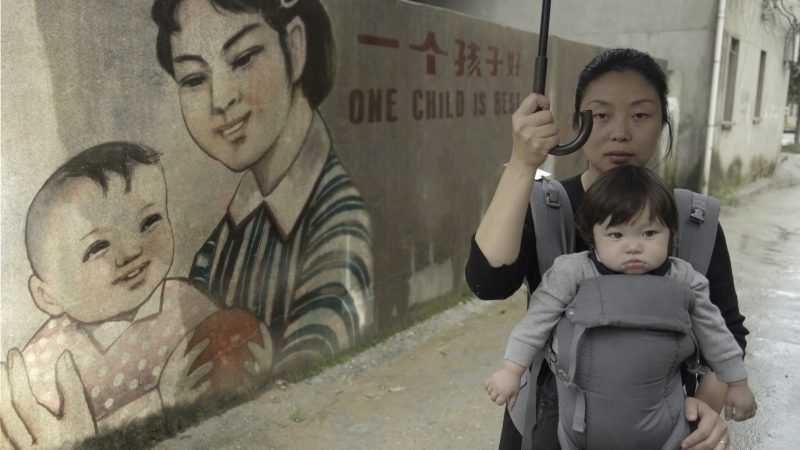Review: One Child Nation
A quietly horrifying look back at China’s disastrous, 35-year-long national birth-control program.

Anyone drawn to the now-resurgent notion that collectivism is kind of cool would benefit from a viewing of One Child Nation, a documentary that demonstrates what can happen when state bureaucrats are allowed to fundamentally re-order their country's most intimate cultural customs. The film's subject is China's disastrous one-child policy, which was imposed upon the populace from 1979 to 2015. During that time, no family was allowed to have more than one child; occasional exceptions were allowed, mainly in rural areas, but they had to be granted by Communist Party officials down to the village level. Families that made the mistake of quietly spawning a second child were ratted out to authorities by neighborhood snoops, who were encouraged by the state. Unlicensed babies were seized and placed in state orphanages. Forced abortion and sterilization were key tools in the struggle to contain China's exploding population, which had topped a billion people.
The film was directed by Nanfu Wang and Jialing Zhang, two China-born filmmakers now residing in the West. The picture seems artless—an assemblage of period file footage and talking heads, basically—but its cumulative impact is powerful. By the end I felt that my heart was ready to burst from my chest and leap to its death down on the floor.
The people we see in this film are discussing terrible things they did in the past. An old midwife, who says she carried out between 50,000 and 60,000 abortions and sterilizations over the course of her career (a sterilization took about 10 minutes, she says), recalls inducing the births of infants and then killing them. ("I had no choice," she says. "We didn't make decisions, we only executed orders.") Another woman recalls the birth of the second child for which she had secured permission, and her own mother coming into the room with a bamboo basket and saying, "If it's another girl, we'll put her in the basket and leave her in the street." Yet another woman remembers accompanying her brother to leave his unwanted baby girl on a meat counter in a country market. The child remained there for two days and two nights, unwanted by anyone. "Her face was full of mosquito bites," says the woman, who apparently watched. "She eventually died."
The one-child policy was hard on some men, too. An ex-village chief recalls having to demolish the homes of people who had illegally had a second child. Naturally they resented this, and especially the man responsible for it. "It was really tough being an official back then," he says. He also remembers being called out with a group of other men to subject a rebellious woman to forced sterilization. "I couldn't take part in that," the former chief says. "I just stood and watched."
The growing excess of female children became the basis for a grim trade. One man remembers biking around the countryside in the old days and coming upon four or five abandoned babies on a single ride. ("I just watched them die," he says.) Perceiving the possibility of profit, he became a trafficker in live infants, selling them to the state orphanages for the equivalent of $200 each. After the government began allowing the adoption of Chinese children by foreigners in 1992, the trafficking in infants reached a mini-industrial scale. One American, a man named Brian Stuy, of Lehi, Utah, who has adopted three Chinese girls with his wife, says the price of purchasing one of these babies can run from $10,000 to $25,000—a very nice profit margin for the state.
Stuy and his Chinese wife, Long Lan, run a company called Research China, which uses an international DNA database to connect Chinese "orphans" adopted by Americans to their Chinese birth parents back in the old country. In the film's most moving passage, we learn the story of two twin girls, now 16, who were separated when the Chinese government took one of them and sold her to an American couple. Because of Western press interest, the twin left behind on her family's farm has learned she has a sister overseas, and she wonders about her.
"She probably has milk and bread for breakfast," this girl says. "Her life must be very good there. I hope one day she will come back." As her eyes begin to well up, the girl says, "We'd dress the same, have the same hairstyle, go to school together. It would be so great to do everything together." If it need be said, this is a truly heartbreaking moment. What are the chances these two girls might one day be reunited? (We learn in the film that the Stateside twin has declined to be put back in touch with her birth parents, but that she and her sister are now in touch through social media.)
It's hard to imagine—no, it's impossible to imagine—anyone sitting through this film and emerging from it harboring anything but loathing for the inhuman Chinese communist social system it depicts. But as the totalitarian temptation beckons once again in this fraught time, I wonder if Thomas L. Friedman will see it, and what he might say. You may recall that Friedman, the inimitable New York Times columnist, wrote a piece back in 2009—when the one-child policy was still in full effect—suggesting that America might have a few lessons to learn from China.
"There is only one thing worse than one-party autocracy," Friedman wrote, "and that is one-party democracy, which is what we have in America today. One-party autocracy certainly has its drawbacks. But when it is led by a reasonably enlightened group of people, as China is today, it can also have great advantages. That one party can just impose the politically difficult but critically important policies needed to move a society forward in the 21st century."
Sounds like a plan, I'm afraid.


Show Comments (43)